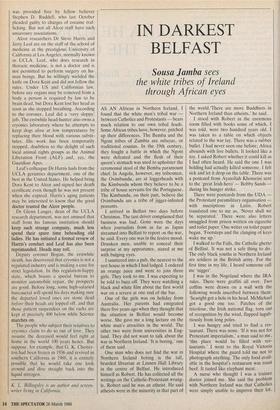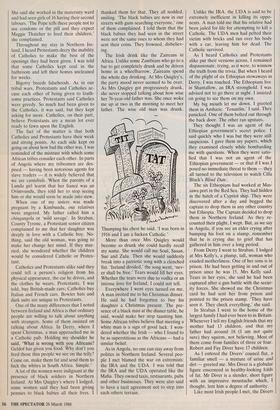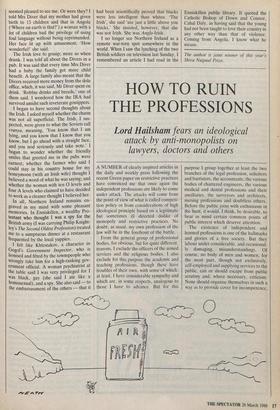IN DARKEST BELFAST
Sousa Jamba sees the white tribes of Ireland through African eyes
AS AN African in Northern Ireland, I found that the white man's tribal war between Catholics and Protestants — bears much relation to our own tribal feuds. Some African tribes have, however, patched up their differences. The Bemba and the Ngoni tribes of Zambia are mbuyas, or traditional cousins. In the 19th century, they fought a battle in which the Ngoni were defeated and the flesh of their queen's stomach was used to upholster the ceremonial stool of the Bemba paramount chief. In Angola, however, my tribesmen, the Ovimbundu, are at loggerheads with the Kimbundu whom they believe to be a tribe of house servants for the Portuguese. The Kimbundu, on their part, believe the Ovimbundu are a tribe of jigger-infested peasants.
I arrived in Belfast two days before Christmas. The taxi driver complained that business was bad. Gone were the days when journalists from as far as Japan streamed into Belfast to report on the war, he said. Every one was in the festive mood. Drunken men, unable to conceal their surprise at my appearance, stared at me with bulging eyes.
I sauntered into a pub, the nearest to the rest house in which I had lodged. I ordered an orange juice and went to join three girls. They took to me. I was expecting to be told to buzz off. They were watching a black and white film about the first world war on a screen at one end of the bar.
One of the girls was on holiday from Australia. Her parents had emigrated there five years ago when they thought that the situation in Belfast would become worse. She gave me a long lecture on the white man's atrocities in the world. The other two were from universities in Eng- land. They did not want to talk about the war in Northern Ireland. 'It is boring,' one of them said.
One man who does not find the war in Northern Ireland boring is the tall, bearded librarian at Linnen Hall Library in the centre of Belfast. He introduced himself as Robert. He has collected all the writings on the Catholic-Protestant wrang- le. Robert said he was an atheist. He said atheists were in the minority in that part of the world.`There are more Buddhists in Northern Ireland than atheists,' he said.
I stood with Robert in the enormous room filled with books some of which, I was told, were two hundred years old. I was taken to a table on which objects related to the war lay. There was a rubber bullet. I had never seen one before; Africa abounds with live bullets. It looked like a toy. I asked Robert whether it could kill as I had often heard. He said the one I was holding had actually killed someone. I felt sick and let it drop on the table. There was a postcard from Ayatollah Khomeini sent to the 'great Irish hero' — Bobby Sands during his hunger strike.
There were postcards from the UDA the Protestant paramilitary organisation with inscriptions in Latin. Robert translated one to me as, 'Never shall we be separated.' There were also letters smuggled from prison written on cigarette and toilet paper. One writer on toilet paper began, 'Footsteps and the clanging of keys wake me up.'
I walked to the Falls, the Catholic ghetto of Belfast. It was not a safe thing to do. The only black youths in Northern Ireland are soldiers in the British army. For the first time in my life, I heard someone call me 'nigger'.
I was in the Nogoland where the IRA rules. There were graffiti all over. Two coffins were drawn on a wall with the following words inscribed between them: `Searight got a hole in his head. McMichael got a good one too.' Patches of the tricolour, the Irish national flag, torn out of recognition by the wind, flapped lugub- riously from long poles.
I was hungry and tried to find a res- taurant. There was none. 'If it was not for Protestant imperialism,' a man said to me, `this place would be filled with res- taurants.' I went to the Royal Victoria Hospital where the guard told me not to photograph anything. The only food avail- able in the hospital's restaurant was roast beef. It tasted like elephant meat. A nurse who thought I was a trainee doctor joined me. She said the problem with Northern Ireland was that Catholics were simply unable to improve their lot.
She said she worked in the maternity ward and had seen girls of 16 having their second labours. 'The Pope tells these people not to use condoms or the pill and they expect Maggie Thatcher to feed their children,' she complained.
Throughout my stay in Northern Ire- land, I heard Protestants decry the inability of Catholics to make the best of the openings they had been given. I was told that some Catholics kept coal in the bathroom and left their homes uncleaned for weeks.
Bigotry breeds falsehoods. As in our tribal wars, Protestants and Catholics ac- cuse each other of being given to loath- some practices. Protestants said Catholics were greedy. So much had been given to the Catholics, it was said, but they kept asking for more. Catholics, on their part, believe Protestants are a mean lot ever ready to fawn upon the English.
The fact of the matter is that both Catholics and Protestants have their weak and strong points. As each side kept on going on about how bad the other was, I was reminded of the mistrust with which some African tribes consider each other. In parts of Angola where my tribesmen are des- pised — having been notorious agents for slave traders — it is widely believed that we are cannibals. When the parents of a Lunda girl learnt that her fiancé was an Ovimvundu, they told her to stop seeing him or she would soon be made into stew.
When one of my sisters was made pregnant by a Kimbundu, our relatives were angered. My father called him a chingangela or 'wild savage'. In Straban, County Tyrone, a Protestant senior citizen complained to me that her daughter was deeply in love with a Catholic boy. No- thing, said the old woman, was going to make her change her mind. If they mar- ried, she wondered whether the children would be considered Catholic or Protes- tant.
Catholics and Protestants alike said they could tell a person's religion from his physical appearance, the car he drives, and the clothes he wears. Protestants, I was told, buy British-made cars; Catholics buy Italian and French cars. Bowler hats and dark suits are unique to Protestants.
One of the many differences that I noted between Ireland and Africa is that ordinary people are willing to talk about anything with strangers. Some of them insisted on talking about Africa. In Derry, where I spent Christmas, a man approached me in a Catholic pub. Holding my shoulder he said, 'What is wrong with you Africans? Geldof has given you food. Why don't you feed those thin people we see on the telly? Come on, make them fat and send them to fuck the whites in South Africa. Simple.'
A lot of the women were indignant at the presence of black soldiers in Northern Ireland. At Mrs Quigley's where I lodged, some women said they had been giving pennies to black babies all their lives. I thanked them for that. They all nodded, smiling. 'The black babies are now in our streets with guns searching everyone,' one of them complained. I told them that the black babies they had seen in the street were not the same ones to whom they had sent their coins. They frowned, disbeliev- ing.
The Irish drink like the Zaireans in Africa. Unlike some Zambians who go to a bar to get completely drunk and be driven home. in a wheelbarrow, Zaireans spend the whole day drinking. At Mrs Quigley's, the party mood never seemed to be over. As Mrs Quigley got progressively drunk, she never stopped talking about how wise her 76-year-old father was. She once woke me up at two in the morning to meet her father. The wise old man was drunk.
Thumping his chest said, 'I was born in 1916 and I am a fucken Catholic.'
More than once Mrs Quigley would become so drunk she could hardly recall my name. She would call me Soul, Susan, Sue and Zulu. Then she would suddenly break into a patriotic song with a clenched fist. 'Ireland divided,' the song went, 'nev- er shall be free.' Tears would fill her eyes. Whether the tears were due to vodka or an intense love for Ireland, I could not tell.
Everywhere I went eyes turned on me. A man invited me to his Christmas dinner. He said he had forgotten to buy his daughter a Christmas present. The pre- sence of a black man at the dinner table, he said, would make her stop taunting him. Some African tribes believe that meeting a white man is a sign of good luck. I won- dered whether the Irish — who I found to be as superstitious as the Africans — had a similar belief.
As in Angola, no one can stay away from politics in Northern Ireland. Several peo- ple I met blamed the war on extremists: the IRA and the UDA. I was told that the IRA and the UDA operated like the Mafia. They owned taxis, restaurants, pubs and other businesses. They were also said to have a tacit agreement not to step into each others terrain. Unlike the IRA, the UDA is said to be extremely inefficient in killing its oppo- nents. A man told me that his relative had been jailed for life for attempting to kill a Catholic. The UDA men had pelted their victim with bricks and run over his body with a car, leaving him for dead. The Catholic survived.
As I heard Catholics and Protestants alike put their versions across, I remained dispassionate, trying, as it were, to winnow the truth from the trivia. But when I heard of the plight of six Ethiopian stowaways in Derry, I was touched. The Ethiopians live in Shantallow, an IRA stronghold. I was advised not to go there at night. I insisted on going to see them on my own.
My big mouth let me down. I greeted them in Amharic. `Tenastlin,' I said. They panicked. One of them bolted out through the back door. The other ran upstairs.
They thought I was an agent of the Ethiopian government's secret police. I said quickly who I was but they were still suspicious. I gave them my papers, which they examined closely while bombarding me with questions. When they were satis- fied that I was not an agent of the Ethiopian government — or that if I was I posed no immediate threat to them — they all turned to the television to watch Cilla Black's Blind Date.
The six Ethiopians had worked at Mas- sawa port in the Red Sea. They had hidden in the hatch of a Cypriot ship. They were discovered after a "day and begged the captain to drop them in any other country but Ethiopia. The Captain decided to drop them in Northern Ireland. As they re- counted their plight, I wept. But, as we say in Angola, if you see an elder crying after bumping his foot on a stump, -remember that he is crying due to grief that has gathered in him over a long period.
From Derry I went to Straban. I lodged at Mrs Kelly's, a plump, tall, woman who exuded motherliness. One of her sons is in prison. He had been getting in and out of prison since he was 15, Mrs Kelly said. Tears in her eyes, she said he had been captured after a gun battle with the secur- ity forces. She showed me the Christmas card he had sent her from prison and pointed to the prison stamp. 'They have seen it. They check everything,' she said.
In Straban I went to the home of the largest family I had ever been to in Britain. Whenever I tell my English friends that my mother had 13 children, and that my father had around 18 (I am not quite sure) they squirm, not believing. Most of them come from families of three or four. Robert and Fay Diver have 17 children.
As I entered the Divers' council flat, a familiar smell — a mixture of urine and dirt — greeted me. Mrs Diver is a globular figure ensconced in healthy-looking folds of fat. Mr Diver is a slender, short figure with an impressive moustache which, I thought, lent him a degree of authority.
Like most Irish people I met, the Divers
seemed pleased to see me. Or were they? I told Mrs Diver that my mother had given birth to 13 children and that in Angola ('Where on earth is that?') a woman with a lot of children had the privilege of using foul language without being reprimanded. Her face lit up with amusement. 'How wonderful!' she said.
The Irish love to gossip; more so when drunk. I was told all about the Divers in a pub. It was said that every time Mrs Diver had a baby the family got more child benefit. A large family also meant that the Divers received more money from the dole office, which, it was said, Mr Diver spent on drink. 'Robbie drinks and breeds,' one of them said. I wondered how the IRA had survived amidst such inveterate gossippers.
I began to have second thoughts about the Irish. I asked myself whether the charm was not all superficial. The Irish, I sus- pected, were given to what the Soviets call vranya, meaning, 'You know that I am lying, and you know that I know that you know, but I go ahead with a straight face, and you nod seriously and take note.' I began to wonder whether the friendly smiles that greeted me in the pubs were earnest; whether the farmer who said I could stay in his country house for my honeymoon (with an Irish wife) thought I believed a word of what he was saying; and whether the woman with ten 0 levels and four A levels who claimed to have decided to work as a cleaner thought I believed her.
In all, Northern Ireland remains en- graved in my mind with some pleasant memories. In Enniskillen, a wealthy Pro- testant who thought I was a spy for the British army (I was carrying Philip Knight- ley's The Second Oldest Profession) treated me to a sumptuous dinner at a restaurant
• frequented by the local yuppies.
I felt like Khlestakov, a character in Gogol's Government Inspector, who is lionised and feted by the townspeople who wrongly take him for a high-ranking gov- ernment official. A woman psychiatrist at the table said I was very privileged for I was black, gay (she said I ate like a homosexual), and a spy. She also said — to the embarrassment of the others — that it
had been scientifically proved that blacks were less intelligent than whites. 'The Irish', she said 'are just a little above you blacks.' She insisted, however, that she was not Irish. She was Anglo-Irish.
I no longer see Northern Ireland as a remote war-torn spot somewhere in the world. When I saw the lynching of the two British soldiers on television last Sunday, I remembered an article I had read in the Enniskillen public library. It quoted the Catholic Bishop of Down and Connor, Cahal Daly, as having said that the young had not been taught to love their country in any other way than that of violence. Coming from Angola, I know what he means.




















































 Previous page
Previous page